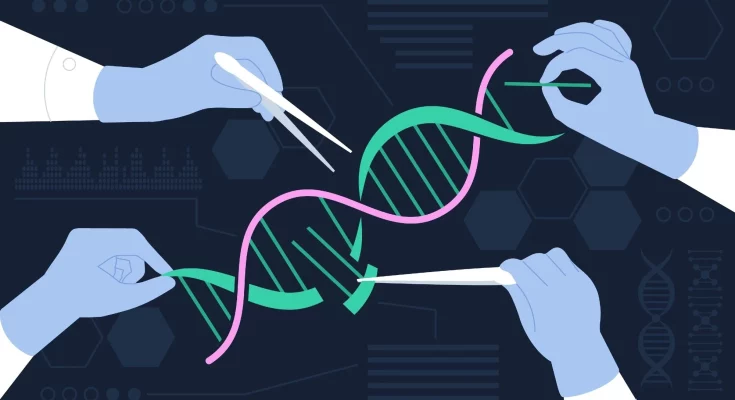CRISPR gene editing has emerged as a groundbreaking technology in genetic medicine. With the ability to precisely modify DNA sequences, CRISPR offers immense potential for treating genetic disorders, improving agricultural practices, and advancing scientific research. This article explores the latest developments, benefits, and challenges associated with CRISPR technology.
What is CRISPR? CRISPR (Clustered Regularly Interspaced Short Palindromic Repeats) is a powerful genetic engineering tool that allows scientists to make targeted modifications in an organism’s DNA. The system utilizes the Cas9 protein to cut DNA at specific locations, enabling researchers to add, delete, or alter genetic material with unprecedented precision. Initially discovered in bacteria as a natural defense mechanism against viruses, CRISPR has since been adapted for various applications in medicine and agriculture.
Recent Advances in CRISPR Technology
- Base Editing and Prime Editing – Unlike traditional CRISPR-Cas9, base and prime editing techniques allow for more precise modifications without introducing double-strand breaks, reducing the risk of unintended mutations. These methods are being tested for their potential in correcting single-nucleotide mutations responsible for genetic diseases.
- CRISPR for Disease Treatment – Recent clinical trials have demonstrated promising results in treating genetic disorders such as sickle cell anemia, cystic fibrosis, and certain forms of cancer. CRISPR-based therapies have successfully edited blood stem cells in patients, leading to long-term improvements in their health.
- Agricultural Innovations – Scientists are utilizing CRISPR to develop crops with improved resistance to pests, diseases, and environmental stress, leading to higher yields and food security. Some notable applications include drought-resistant wheat, disease-resistant bananas, and improved nutritional profiles in rice and soybeans.
- CRISPR in Infectious Disease Research – CRISPR is also being used to combat infectious diseases by modifying viruses to make them less harmful or by engineering immune cells to better fight infections. Studies are exploring how CRISPR can be used to develop treatments for HIV, tuberculosis, and even COVID-19.
- Neurodegenerative Disease Research – Researchers are investigating CRISPR’s potential to treat neurodegenerative diseases such as Alzheimer’s and Parkinson’s by targeting faulty genes and reducing harmful protein buildup in the brain.
Ethical and Safety Concerns Despite its vast potential, CRISPR raises ethical and safety questions. Some of the main concerns include:
- Unintended genetic mutations – Off-target effects may lead to unintended changes in the genome, potentially causing new health issues.
- Germline Editing – Alterations made to reproductive cells can be inherited by future generations, leading to ethical dilemmas regarding genetic enhancement and designer babies.
- Regulatory Challenges – Different countries have varying regulations on gene editing, leading to debates over its global accessibility and governance.
- Biosecurity Risks – The potential misuse of CRISPR for non-medical purposes, such as bioweapons, raises security concerns that must be addressed through international policies.
Future of CRISPR in Genetic Medicine The future of CRISPR holds exciting possibilities, from personalized medicine to potential cures for hereditary diseases. Ongoing research aims to enhance its precision, safety, and effectiveness, paving the way for a new era in genetic medicine. Scientists are working on methods to improve delivery mechanisms, such as using nanoparticles or viral vectors to introduce CRISPR components into specific cells more efficiently. Additionally, AI-driven tools are being developed to predict and minimize off-target effects, further refining the accuracy of CRISPR applications.
Conclusion CRISPR technology is revolutionizing genetic medicine, offering new hope for treating genetic diseases and improving biological research. While challenges remain, continued advancements and ethical considerations will shape the future of gene editing and its applications across various fields. By addressing ethical concerns and improving safety measures, CRISPR has the potential to transform medicine, agriculture, and beyond.




